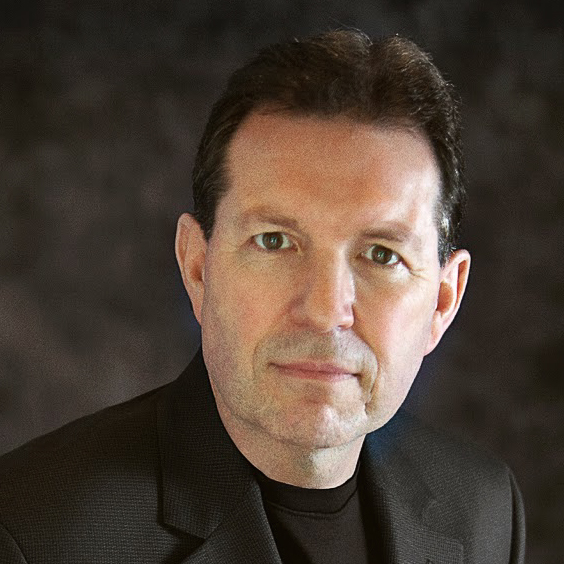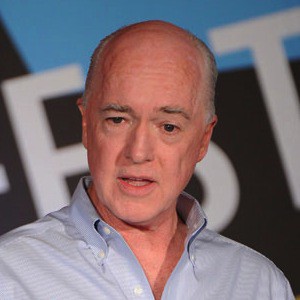John: I’m here with Brock Meeks today, visiting Washington. Brock,
why don’t you just tell me how did you get, career-wise, to where you are
today? What’s your path been?
Brock: That’s a pretty long story.
Let me see if I can give you the journalistic shorthand of
it. Never went to college, I did go to college for a couple of
years, but I don’t have a college degree, so I’m a proud holder of
a high school diploma. I started really writing for my local
bulletin board system, BBS’s.
In fact, I have called myself Journalist Zero when it comes
to online reporting, and have asked my colleagues, “Please prove me
wrong. If there’s anybody out there that was doing this before me,
fine. I’ll gladly hand over the mantle to them.”
I started writing, going out to different events and
reporting, and then bringing that reporting back and putting it
online for my local bulletin board community, which was in San
Diego at the time.
I remember one of the only other folks online at the time
that was doing some of that type. He’d never called himself a
journalist, but he was doing social commentary, was Dave Hughes
from out in Colorado.
From there, it evolved into more of just going out and
covering local events from my local crowd to freelancing stories.
Then I actually became a freelance writer, and I looked long and
hard at what it took to be a freelance writer, and read probably 14
different books on it.
They all had different opinions and so forth, but one of the
things that was constant throughout all of those books is you have
to persevere. You have to keep trying and keep trying and don’t
worry if you don’t get the first thing published, or you rack up
all these rejection letters and so forth. Just persevere.
I told myself I’ll give this a shot. What I’ll do is I’ll
try for two years. If I don’t get anything published in two years
I’ll give it up and become a plumber or something. The other thing
that they all said was writing about something that you know. The
thing that I was really interested in, and knew the most was this
arcane world of telecommunications.
I knew that by using telecommunications you could tap into
these things called databases, the Fortune 500 companies were
tapping into for lots of money and stuff like that. The little guy
could also tap into these things and do research, and do things
like fight the incinerator in your backyard. I thought, ‘I’ll start
writing about telecommunications.’ This was in the era I had a
Commodore 64 computer.
John: We’re talking about ’84?
Brock: You’re right, ’84. A Commodore 64 computer and what, at the
time, was called a HesModem where you actually had to dial the
phone number, and then unplug the cord from the handset when you
got the carrier tone, and plug it into the back of the Hess modem
to make the connection. It had 300 bps. That was it.
The very first thing I wrote about was a database program
and how to use it and sent it in. Lo and behold, I got a $35 check
back in the mail. The very first thing I tried to get published was
published. To this day, I’ve rarely had an article accepted that
has given me as much joy as seeing that $35 check in the mail.
From there, my freelance career just took off, and I kept
writing for bigger and bigger publications. Started a column in
Byte Magazine that was called Comm1 that was talking about
communications. At the time, I had upgraded through the ranks and I
was writing on a Kaypro computer, and had a column in the Kaypro
magazine, the magazine for Kaypro computers, which was called
Profiles.
That was called “Life at 300 Baud” Again, it was all writing
about being online and using this thing called telecommunications,
and the type of stuff you could do with it. One of the early
columns I wrote was buy a modem, welcome to the white boys club,
which was all about how it was overwhelming white males and there
was no diversity.
This was back in the mid-’80s. How if this area was going to
thrive it had to diversity and it had to bring in other voices.
Sure enough, today you hardly see anything anymore about non-
diversity of the online world. It was all technology that I was
writing about. It was all freelance.
Then I got some jobs, regular jobs. I was a contributing
writer to several different computer magazines and so forth. Then I
decided to try my hand at being a foreign correspondent, and got on
with San Francisco Chronicle and did a stint with the Chronicle as
a foreign correspondent in the War in Afghanistan.
Had a horrendous time over there, because I was reporting
right after the Soviets pulled out. I was embedded, before the term
was even invented, with a group of mujahideen that was in the first
offensive to try, and capture the old provincial capital of
Afghanistan which is Jalalabad, so they could get up their interim
government and the U.N. could recognize them and all this kind of
stuff.
The Afghan guerrilla army tried to turn overnight from this
guerrilla army to a conventional army and they got slaughtered.
Everybody that was around me died. My interpreter saved my life
unwittingly
by acting as a human flak jacket for me. I got wounded
over there. It was a very horrendous experience.
But $10,000 in therapy later I can sit here and I can tell you
all of that without suffering any of the nightmares. My editor at
the Chronicle just told me, I won an award from the World Affairs
Council for that reporting, that I might win a Pulitzer for it, but
that was the same year that the Berlin Wall fell and Tiananmen
Square. Of course, Kristof won it. Such is life.
My editor told me to just come back to the Chronicle and
write from my notebooks and write anything I wanted to. I found
that I couldn’t. It was part of PTSD. Back then, I just locked up.
Couldn’t write, dropped out of journalism for two years. Thought
I’d never write again and worked my way back into it.
At the low point of my life I hired myself out as a word
processing temp. As I was doing that, I would be retyping memos and
so forth, I started to edit the memos and I started to change some
things around and people started to notice. I started getting some
writing assignments from that.
From that, I eventually hooked up here back in Washington
with a trade publication called Communications Daily. That really
saved my journalism career. It was like going back to boot camp,
writing for this newsletter, because I was having to crank out
3,000 words a day.
I was covering the telecommunications industry back when we
still had the Baby Bells and AT&T sitting out there and this
thing that was beginning to pop up called the internet.
I had always been using services like CompuServe, and the
Source that Murray Turoff. I forget where Turoff was out of. He
wrote “The Networked World” and would talk about these things as
computer mediated discourse, but it was really forums that were
locked up inside, things like CompuServe, and America Online, or
the Source.
I found early on that you could mine the special interest
groups for experts. Again, I think I was one of the only reporters
that were doing that at the time except for a guy named Art
Kleiner. Art Kleiner, last I heard, he was a professor at NYU
someplace. Art was writing for Whole Earth Review out of San
Francisco.
John: Stewart Brand.
Brock: Yeah. Art, I found out, was doing the same thing, but his
was all print. All the stuff I was doing was online. Art was out
there but he was the only one I can remember that was mining these
computer systems like CompuServe and the Source.
My home base, of course, was the WELL. It had a
tremendously fascinating group of people and some of the brightest
people on the planet were trafficking on the WELL. The WELL was my
home, my home base. When I got to Communications Daily and was
writing all of this stuff about the Baby Bells and everything and
this thing called the Internet started bubbling up, writing for
the newsletter was like writing with handcuffs on.
At the time, they wrote in what was extended headlines.
They never used any articles so you couldn’t say “today the company
announced a new product”. You would say “company announced new
product.”
John: Telegraphic.
Brock: Telegraphic. It was considered a success if I wrote one or
two interesting sentences in the entire story. Out of that, I
started writing at night CyberWire Dispatch and adopted this
alternate Hunter Thompson persona. The New York Times famously said
that CyberWire Dispatch was laced with savage profanity at the
time. That was Evan Andrews that wrote about that.
CyberWire Dispatch was unnamed at the time, but I was doing
investigative reporting based on stuff that I was hearing here and
there. I was doing some hardcore investigative reporting on
CyberWire Dispatch all on my own and all at night and did a big
piece, I remember, on the FBI’s Carnivore system.
This was a scheme by the FBI to place a tap on people’s
modems and so forth, and capture all the traffic coming out of
them. The FBI had tried to deny it. A group here in Washington
that’s still in existence, EPIC, the Electronic Privacy Information
Center, run by a great group of people and headed by Marc
Rotenberg, who is still there,got some documents and leaked those
documents to me. I used
those documents to write about this. It had a budgetary proposal in
it or something like that. I wrote about it, and I put this out on
what was then my unnamed publication. Lo and behold, the next
morning the New York Times had a story on it, too. Too much of a
coincidence. I’m not going to say the Times stole it.
John: It was too much of a coincidence.
Brock: Too much of a coincidence. I groused a little bit about
this on the WELL which was the home base for my publication, and
Kevin Kelly said, “You know what you have to do is you have to give
this thing a name. If you give it a name and you brand it people
will have a lot harder time stealing from it.”
I came up with the name CyberWire Dispatch. Mitch Kapor
said that by doing that I created the first brand in cyberspace. I
created this thing called CyberWire Dispatch. CyberWire Dispatch,
at the height of its readership, had about 800,000 people reading
it. That was based on how many at the time it was called
newsgroups.
People would have newsgroups. I know it went throughout
40,000, 50,000 newsgroups, throughout the FBI and the Pentagon. I
had about 800,000 readers at the time. It was breaking stories left
and right and competing with the mainstream.
The notoriety I got from that led me to get a job with
Wired magazine. I was on staff for Wired magazine for a while. Then
MSNBC came in and they stole me from Wired magazine. I spent 10
years at MSNBC where I wrote for the website. I was on NBC News
Tonight with Tom Brokaw and also was on-air for the cable
channels.
I was a triple threat doing all these things, working out
of the NBC office here in Washington D.C. with Tim Russert and Pete
Williams and all those great folks. Andrea Mitchell and all that. I
did that for 10 years and then I had done everything I thought I
could do with MSNBC, had won all the awards I could win.
At the time, they still weren’t giving Pulitzers out for
online stuff but I won all the online awards that were given out
for online stuff so I just walked away from journalism at that
time and decided I wanted to see what it looked like from the
other side. Instead of always trying to figure out what’s happening
inside the room, I wanted to be inside the room.
I joined on with Center for Democracy and Technology, a
public interest group here in Washington D.C., as their
communications director and got to be inside the room and see how
legislation was influenced and really be a part of keeping the
Internet open, innovative, and free, as the tagline says.
But I always missed journalism. I always, always missed it.
About a year and a half ago I left CDT and this opportunity here
at the Atlantic became available for this new kind of journalism
which people call all kinds of different things. I prefer the term
“branded journalism.” I decided to come on-board and try to do the
same thing I did for online journalism which was elevate its
integrity to the same spot as print journalism.
I don’t think anyone now sees a difference. It has just as
much integrity but that wasn’t always the case. Now I’m trying to
do the same type of thing for branded journalism and make sure it
is done with the same rigorous standards that any type of straight-
up journalism would be doing. That’s where I am today.
John: Branded journalism is also known as what else?
Brock: There are different names for it. There’s sponsored
content, there’s native advertising. Branded journalism, what we’re
doing here is, for example, where a company isn’t paying for an
article to be written to be placed as an advertisement on some
place.
For example, for a year I was running GE’s Ideas Lab. Ideas
Lab publishes all kinds of things from advanced manufacturing, 3D
printing, and lots of stuff about innovation, healthcare, and
aviation. It’s sponsored by GE, but it’s not a mouthpiece or a
platform for GE content.
In fact, when I left Ideas Lab the content was 90 percent
contributed by outside contributors and not GE people. A lot of it
was op-ed style perspectives. Some of it was what we called in-the-
field reporting which was straight-up journalism about all those
different topics. It was no different than the stuff you could see
in the New York Times or any other newspaper.
The only thing was instead of having the New York Times
being the publisher it was GE who was the publisher. I’ve switched
from Ideas Lab. We’re going to be launching a new site called Brink
that is going to be sponsored by Marsh & McLennan Companies
and it’s going to deal with global risk.
That’s the branded journalism as opposed to native
advertising which is where a company like, for example, a gas
company or an association, the American Association of Natural Gas
or whatever, will buy a spot on The Atlantic or Vox or someplace else and
say, “We just want stories about natural gas. How natural gas is
affecting the economy, how natural gas is effecting transportation
today, and that type of thing.”
The associations won’t tell you what to write they’ll just
give you some broad ideas. You won’t be writing about the
association, but you’ll be writing these stories about natural gas
to up the level of natural gas in the minds of people. Then, of
course, the publications themselves have different ways of, even
the Times, setting that content off from the regular stuff that’s
done by their staff. That’s what we’re doing.
John: One of the interesting things about your career path is
that, unlike many of the others I’ve talked to, you almost stepped
backwards in the transmission thing. I have to believe you were
using a telex in Afghanistan. How were you getting your stories
back to San Francisco?
Brock: That’s a great question. The telex machine at the San
Francisco Chronicle was broken. However, at the time there was a
great email network called MCI Mail. MCI Mail had a couple of
different facilities to it. You could send a fax through MCI Mail,
but you could also send a Telex through MCI Mail, and you could
send a telex into MCI Mail.
MCI Mail would take that, turn it into an electronic mail
message, and send that electronic mail message to the address. So
from Afghanistan, it
was actually from Peshawar… All of the news out of Afghanistan went
through this little two-telex machine shop in Peshawar. Mr. Aziz
ran the telex shop and he was a master at being able to route your
stuff wherever you want it to go.
You would sit down at a telex machine, you would type
into this old telex machine and it would cut a tape. It almost
looked like it was in braille. You would do your story and you
would take your tape, and you would hand it to Mr. Aziz and say, “I
want it to go to this address,” and he would feed it in.
I had a freelancer back in San Francisco that had an email
account, somebody that would take my copy. The telex machine would
transfer it to her email account. She would do some copy-editing on
it, and then send it by electronic mail. Also, it was only in upper
case so she would take care of going upper and lower case. Then she
would send it on to my editor, David Hipschman at the Chronicle. He
would work his magic on it and then it would go into the paper.
John: It was truly an intermediary effect in the sense that
changing from telex to email or a precursor of email at that
point.
Brock: Yeah, it was fascinating how it worked. I remember at one
time it got routed to a wrong place so an MCI operator who had
seen my email come through at one time…. When we would get emails
back it would have to be transferred the other way. We would get
the email back, but it would be cut into a telex and Mr. Aziz would
hand you a printout from the telex machine.
I got a message that said I’m so-and-so and so-and-so from
MCI. I intercepted your message because it got sent to the wrong
place. I assumed you wanted it sent here so I sent it on. I hope
that was OK. It was just serendipitous stuff like that and how the
news got out. It was amazing.
John: It was. The other interesting part is your audience. Going
from a bulletin board which is far more intimate than a print
paper, also your career has marked huge transitions in the
audience. Have you felt that? How did that influence your
storytelling? Whether it’s using a bulletin board for sourcing, to
change the CyberWire Dispatch to hear the readers, how has that
affected your storytelling about how you think about things?
Brock: It made me a lot more accountable because, believe me, if I
got a fact wrong, or some minor point was misstated I heard from
hundreds of people, and people that knew what the hell they were
talking about. I felt immediately accountable every time I put a
piece out, because I knew I was going to hear from these people,
and I heard from them immediately via email.
Throughout my career, I’ve made it a principle of mine to
respond to every single piece of email that I ever got. I checked
and double checked. Throughout my career, I’ve had very little
corrections because one of the things I also was able to do,
because I knew all these experts were out there, and this is an
early form of crowdsourcing is, I would go to these people and I
would say, “What is this all about?”
I would get back 20 or 30 replies. You could do it all by
emails. This was especially useful when you were in a computer
mediated system like, The Source, or CompuServe, because you could
just jump into a specialized area and say, “Hey, I’m doing a story
on such-and-such. I don’t really understand it. Could somebody
explain to me?”
You get 20 or 30 replies from experts and then you would
say, “Can I quote you saying this?” It was really easy to generate
sources and stuff. I think being online made me a lot more
accountable because my readers were personal to me.
John: A similar arc is going from a readership and a source
that’s very industry-centric like when you came back from
Afghanistan and writing for a trade press into going into MSNBC
which is not. How did that change? Did you find that general
interest more daunting or was it easier to reach?
Brock: It was more daunting being on TV. Let me tell you that
right now.
John: That’s why I’m sitting beside the camera.
Brock: It was amazing. That little red light would come on and
you’re on with Tom Brokaw or somebody, how that affects your head.
It got easier through the years, but it never got easy. It never
got easy. It was interesting, too, when somebody would see me on
television. I always found this fascinating. They would say, “Hey,
I saw you on TV last night.”
I’d say, “Great, what was it I was talking about?” “I don’t
know, I just saw you on TV.” It must have been something really
important, right? The thing was I rarely heard feedback from the
folks that saw me on television. Maybe it was because they didn’t
have a ready way. They didn’t put my email address up there on the
chyron or anything like that. Certainly, I heard from
people that were reading my stuff on MSNBC.com so that was the same
type of thing. I would get hundreds of pieces of mail from them.
John: Question. Did you hear more from the people reading on
MSNBC.com or the people watching on TV? Which was the more active
audience?
Brock: MSNBC.com by far, that could have just been a couple of
reasons. The people watching me on TV, just knowing the
demographics of the people that were watching the news at night and
stuff, probably didn’t have computers in great use at the time as
people that were reading me online.
John: That level of engagement always seemed stronger online?
Brock: Always. Always.
John: How did companies respond? In talking to colleagues
throughout, they argue, and you had an arc, too. They argue that at
one point it was far more accessible. Companies really came to you
at one point. Now it’s less so. Yes, no, how do you see that? How
do you see the arc of you as a…?
Brock: Interesting. That’s true, but I think it all came down to
relationships that you made. I never found companies that difficult
to reach but it was because of the relationships that I made with
the press people and stuff at those companies, or the relationships
that I made with officials at conferences and stuff that you would
meet.
John: It’s relationships rather than the brand, you think?
Brock: Yeah, but people knew me, too, as a brand. They didn’t see
me as the New York Times. They really didn’t see me as CyberWire
Dispatch. They saw me as Brock Meeks who writes CyberWire Dispatch.
Relationships, really the key for me back in those days.
What’s interesting today is that companies are finding out
that using things like branded journalism they don’t have to go
through press people, whatever, and hope that somebody on the
business desk of the New York Times will write about their thing.
They can go directly and get their stuff published by having a
journalistic piece written by somebody, like I said, about strategies
that’s sponsored content.
Or they can take the route that GE has done or Marsh &
McLennan now with Brink, and sponsor their own publishing platform
on areas that are important to them.
John: Just as you said and colleagues have mentioned, companies
get their message out its multi-channel now rather than that single
channel that was journalists for many years.
Brock: I’ll tell you what never changed was government was
incredibly hard to crack, no matter what. Government always
remained tight-lipped no matter where I was, MSNBC, or just out on
my own doing CyberWire Dispatch. It was always hard to get
government to open up.
John: Particularly because one of your interests over the years
has been privacy and they’re particularly close-mouthed on that.
Brock: Right. Exactly. After 9/11 happened I was made the Homeland
Security reporter for MSNBC, and had to standup that entire beat. I
broke a lot of stories, a lot of important stories, in one of the
hardest nuts to crack which was the Air Marshal Corps.
Then again it wasn’t because I was such a brilliant
reporter, but it was because a disgruntled air marshal that
happened to be a boyfriend of a former girlfriend of mine, she
introduced me to him.
This guy was a standup patriot from a long time ago and he
was upset with how he saw some of the stuff happening in the early
Air Marshal Corps when they had to go from 33 air marshals on 9/11
to 4,000 three months later. They were bringing in all kinds of
questionable people and so forth. This guy was just Mr. Patriot,
standup, and he left a good job as a military investigative
reporter to become an air marshal.
He felt things weren’t going right. He didn’t get any
satisfaction talking to his bosses so he started talking to me.
Once I published that story it was like shaking the tree. Other air
marshals saw that I did a good job with the story and then the
sources started coming. That’s how I was able to crack government,
but they’ve always been hard to crack.
John: They always have. It’s interesting, as I mentioned to you
walking up here that it seems like in this series of interviews I’m
being an alumni party, or holding a reunion by proxy, because many
of you worked together as colleagues in the ’90s and 2000s. What
was the relationship like within that press corps covering tech?
Was it collegial? Was it competitive? What was it like?
Brock: It was always competitive. Among the reporters it was
collegial. I consider all those guys my friends, but it was their
bosses that certainly thought that online journalism took a
backseat, or was a lesser form of journalism than what came out in
print.
I remember the days when it was forbidden for a story to
break online before it appeared in the paper the next day. Can you
imagine this? When the San Jose Mercury News would have some big
story about tech they couldn’t break it on their online. They had
to wait until it was published in the morning.
The Dallas Morning News was one of the first ones to start
publishing something before it hit the paper. I could be wrong on
that but that’s what I remember is the Dallas Morning News
published a story, a big scoop, online and then it was like oh my god.
Everyone as scrambling to cover it, it was like maybe we don’t have
to wait anymore.
Today that’s unfathomable that you would hold the story
until it first saw print, but that’s what I was working against in
those days.
John: Can you remember the first story you broke online?
Brock: The first story I broke online?
John: Yeah. That would apply to all of us today.
Brock: What was the first story I broke online? Probably the
biggest one was the one on Carnivore that I mentioned before, the
FBI’s thing.
John: That was on CyberWire Dispatch.
Brock: That was right before CyberWire Dispatch.
John: Before it became named.
Brock: Before it became named, yeah. That was probably the biggest
one I broke.
John: Are there other inflection points, as you think back,
things that made a difference in the growth of this online medium?
Some people have mentioned 9/11, only because you suddenly had
people at their computers looking for news during the course of the
day.
Other people mentioned AOL. Some people thought it was
earlier than ’95.Are there any inflection points you see and what
turned?
Brock: I know that one of the earliest examples I can remember of
crowdsourced news happened back when, I don’t know if you remember
this or not, but Time Magazine published a horrendous story about
online pornography. It was a complete hoax. They were hoaxed by a
named Marty Rimm.
I started to investigate it using CyberWire Dispatch, but
it was really a crowdsourced effort because I put it out on the
WELL. People on the WELL said this thing must be a hoax. We must
have had 25 people all “pounding the pavement” looking for pieces
of this story, and they would report back what they had found,
people they had talked to on a discussion group on the WELL.
Then I was taking that and doing my own reporting.
Eventually, I got to Marty Rimm himself. He basically admitted that
it was made up and I published this big piece about how the Time
had been duped. CyberWire Dispatch won an award for it. I could not
have done that without the folks on the WELL doing their own
reporting. It was really crowdsourced.
People fed off of each other, took tips from each other,
and took pieces of the puzzle and got together and that type of
thing. That was a big inflection point. Of course, you see that in
real time today with reporters using Twitter, and being able to get
pieces of the story, and pull in things like that on a real-time
basis.
John: Interesting. One of the things you touched on earlier I
want to drill a bit on, when you started out, when you worked for
the San Francisco Chronicle you worked for an institution. In other
words, your work was designed to boost the institutional brand more
than your own.
How do you look at branding now where now it’s important
for the reporters to have their followers to do their tweeting? How
do you view that tension between institutions and journalists over
the question of brands? Do you view it as tense?
Brock: I understand where the tension could be, but if a
publication is leery of that I think it’s at their own peril. I
remember a time when the Wall Street Journal wouldn’t allow its
reporters to talk online about anything that they were doing. How
amazing is that? They were forbidden from going online and talking
about anything they were reporting. Insane.
Of course, that’s not the case anymore, but it was because
a managing editor, who shall remain nameless, at the Wall Street
Journal told me, I was at a conference talking to him at lunch, he
said, “We don’t want to give away our intellectual property.” I was
like, “Are you kidding me?”
That was amazing. Today, publications that allow their
reporters to become their own brand, I think, are doing themselves
a service. I know some reporters don’t want to do that or don’t
know how to do that, but I think, again, it goes back to creating
those relationships and creating that name for yourself out there
in cyberspace.
People are drawn to that because there’s so much out there,
that the brand of the reporter then becomes the filter. They may
not like the publication, or they may not like this or that, but
they can trust the reporter. When I was doing CyberWire Dispatch I
can’t tell you how many times I had people tell me, “You know what?
I don’t agree with 90 percent of what you write,” because I was
very opinionated in what I was writing.
Along with the opinion, what I always made sure to do was I
was rigorous in presenting both sides of the story. My reporting
wasn’t objective. I think objectivity is the false god of
journalism, and I’ve said that from early on, but I was rigorous in
reporting both sides of the story. Then I would put my opinion on
it and say this is which side I think is right and why.
A lot of people would write to me and say, “I don’t agree
with your opinion, but I follow you because I know you’re going to
give me the truth on both sides of the story, and you’re giving me
stories that I don’t see anyplace else.” A lot of people used me as
their filter for finding things.
I think it’s the same way today. Because there’s so much to
choose from, people will gravitate toward a particular reporter
because they trust that reporter, they trust that brand, and they
use that reporter as a filter for their news rather than the
publication itself.
John: One of the questions that we’re all riddled by, we’re all
asking ourselves, is are you surprised at big media is in trouble
now? The day after CBS decides to stream on the Web, two days after
HBO. Are these developments stunning to you? How do you navigate?
Brock: I think that big media for a long time has been struggling
to find the alchemy that a lot of these newer publications, like
Fox and Vice, and even going back to some of the grandfathers, it
seems funny to call them grandfathers now, like Slate and those
folks picked up on early on.
I don’t know if it’s because the leadership has tried to
protect its big cash cow or something like that. They have so much
invested in it or they’re afraid of change. They’re afraid of
letting their reporters have opinions. They’re afraid of letting
there be too many cowboys out there or not.
They’re coming to see that that’s what an audience wants.
I’ve always said this; the reader is smart enough to know if
somebody’s just blowing smoke up their ass. The reader’s smart
enough to know, and they’ll just disregard them. Let your reporter
have an opinion. Who else knows the thing better than the guy
that’s covering it day in and day out?
Let the reporter have an opinion as long as the reporter’s
not playing fast and loose with the facts. So what? You’ve got an
editor that’s keeping him in line. I always said I wrote the hell
out of a story, and thank goodness I had editors that would edit
the hell out of the story that could rein me in.
I’m very, very lucky over the course of my career that my
editors all realized what I was doing, and how I operated and gave
me my head and let me do that.
John: A number of your colleagues have said the one thing that
needs to happen in parallel of this, of the reporters becoming
brands, getting out there, whether they’re working with editors, is
that the readers have to become smarter.
They have to be able to make their own judgments and be
schooled in making their own judgment about this source is good, this
source is bad, and who do I listen to. Do you think that’s a
requisite or do you think that’s hope against time, hope over
experience that readers become smarter?
Brock: Was it Barnum or Bailey or somebody who said, “Nobody ever
went broke underestimating the intelligence of the American
people.” I don’t know, I always found
the readers to be smart enough to filter out the good from the bad.
I don’t know that they have to be better educated or better at
finding the source.
I think people that gravitate toward Fox News are going to
gravitate towards Fox News. That’s what they like. Does that mean
they have to be smarter? I don’t particularly think Fox News is the
paradigm of journalism, but they probably don’t think what I do is
the paradigm of journalism, either.
The reader will gravitate towards what they know and what
they think is best. I really don’t think the reader has to become
smarter. Probably, they have to become more efficient because
there’s so much out there they can easily become overwhelmed.
This gets back to why I think they will gravitate towards
the brands of the reporters, because they’ll start to pick and
choose. As far as the readers getting smarter, I think the readers
have always been smart.
John: You start off by covering telecommunications and being in
Washington. You were never in Silicon Valley. From afar, how does
it look to you like the tech world has changed, the culture of the
technology world has changed?
Brock: I think they’ve gotten better at realizing you can’t keep
Washington at arm’s length. It used to be Silicon Valley would
just say, “F-U Washington, let us do our thing.” They found
out pretty quickly that if you do that they’re going to get rolled
every time.
I think they realized now that you can’t ignore what’s
going on here in Washington. They have to educate people here in
Washington. They have to be a part of the Washington dialogue in
some way, shape, or form whether that’s being active participants
supporting some kind of non-profit organization, like where I used
to belong to Center for Democracy and Technology, Electronic
Frontier Foundation….
People that are engaged with Washington back here, or they
have to be ready and willing when the flag goes up to step up and
take an active part. For example, a couple years ago when we had
the great Internet blackout. That was in the big SOPA/PIPA debate
where people stood up, they participated, they actually melted the
phone lines, they overflowed the phone lines.
A big part of that was the tech community got behind that.
They understood that now is the time. Here’s the line in the sand.
Silicon Valley is getting more and more educated to the fact that
you’ve got to play in the same game that the man’s playing in, you
have to play the man’s game, but you have to be in the game or
you’re going to lose every time.
I know that start-ups don’t like to think about policy and
some of the other technologies companies that don’t want to be bothered with
policy, because it’s not putting hardware in people’s hands or it’s
not coding software. Unless they take more of an active interest,
and unless they pay attention, they’re going to get rolled. It’s
just going to happen every single time.
John: Some people have said what you’ve seen because of the
growth of the influence and the money in tech, these two
journalistic worlds are getting more and more alike. Covering
politics is like covering tech. You’re trying for access, you’re
trying for influence. You need to get in that closed circle.
You’re here in Washington. Do you think that is at all
true, that it’s you’ve got to get close to Apple. Is there any
parallel or don’t you see it?
Brock: Maybe I’m misunderstanding your question. I think you’ve
always had to get closer to whomever it is that you’re covering.
John: I think it’s the level of influence in these circles that
you’re covering. In politics, it always helped to get close to the
top. In tech now it’s get to Google, get to Facebook. It’s closing
in, and it’s harder, the argument goes, to keep it requisite
journalistic distance.
Brock: Oh, I see what you mean.
John: OK? That you trade off access.
Brock: Yeah. That is always the danger. The more access you have,
the less willing you are to write something negative, and could be
afraid of losing the access. I know that certainly is endemic here
in Washington with political reporters. I don’t know for sure, but
I can see the same thing happening in tech.
There’s so much, there’s so many other ways to get access
to things and these companies that you don’t have to get close to
the people at the top. Man, today, there are just so many avenues
that I don’t know how some of these companies keep secrets, because
there’s so many ways.
Not just ways here in America, but people are going
overseas. Just look at all of the leaks about the iPhone 6 before.
We already knew everything about it before it showed up on stage,
and it was amazing with pictures and everything else.
There’s a whole cadre of global sources out there
that are within arm’s reach, that weren’t there when I was doing
Cyberwire Dispatch. It was still a global world but you
couldn’t get to them as easy as you can today.
John: Now, do you looking back, how would you say journalism
covet this digital era, this digital trend these last 20 years? How
did we do journalistic, we as a group?
Brock: How did we cover the digital transformation? Well, I think dragged
kicking and screaming into it. Going back to what we were talking
about before, about how online journalism was always seen as the
red-headed stepchild of journalism. I don’t know how you could
cover tech without being in the online world itself, it was such a
part and parcel. Telecommunications was infused in all of that.
The fact that I broke a lot of stories on CyberWire
Dispatch that weren’t showing up in the mainstream press is
another indictment of how they were covering it.
For a long time, the San Jose Mercury News probably did a
better job than most, because they were right there. I remember
some early stories that they did about the health of workers on
assembly lines. You’d just enter the grade A components and having
to work with the chemicals and stuff like that. They did certainly
some good stuff. That was their beat. We hoped that they would do
that kind of stuff.
You had one or two guys, Markoff, certainly. Markoff’s arc
of his career, he grew up through “InfoWorld” and all that. He was
hard-coded into that.
John: Not quite the native you were.
Brock: Right. He always had access and did good stories and did a
good job of covering it. But As a whole, it was in fits and starts.
There was more of gee-whiz reporting than there was holding
people’s feet to the fire.
John: Did you see this meteor coming? Could you have predicted
where we are now 20 years ago? Did the speed of the transition
surprise you?
Brock: I predicted a lot of it in one form or another. I remember
a story I did for ACM Magazine talking about how one day you’d
be able to walk around and be able to go online from wherever you
were, because there would be these things on telephone poles or
whatever. I was talking about micro-hotspots and now it’s WiFi all
over the place.
I foresaw an era where you would always be online at some
place. I didn’t know how you were going to do that but I foresaw
that type of thing.
What I did not see, I did not see social media in the form
that it is today, certainly with the rapid, real-time and rolling
present of how you can cover things and get information like that.
I saw more access to things that I saw with computer systems,
computer conferencing systems like the WELL and CompuServe.
The people have more access wherever they were to those
type of things and you would have these sequential discussion
things, but I couldn’t have thought that you would be able to have
25, 50 conversations in a two-minute time period with Twitter and
be able to grab things real-time like that. I didn’t see that
coming at all.
John: What do you think about journalism prospects? Are you
upbeat, downbeat? How do you think the craft you’ve got into, how
do you see that going forward?
Brock: First of all, I see it being as strong as ever. I think
that reporters today have to work a lot harder because they’re in
competition with everybody that can be a reporter today, and
everybody basically is. I also think that really good reporters,
and this is a total switch from what it was.
In my day, I used to go to IRE conferences, investigative
reporters and editors, and be on panels and tell them all my
secrets about going online. People would say, “How come you’re
telling us all these secrets?” I said, “Look, the truth of the
matter is 90 percent of you are going to go out of here and forget
everything I said and not do it because it’s too hard. They’re not
going to take the time to learn so it’s not any competition. The 10
percent of you that do are going to find your way.”
Reporters had a reluctance to get online and do this kind
of stuff. Now everybody’s online and they do too much of it
online. The really good reporters, the ones that are getting the
scoops, are getting up out of their desk and they’re going back to
shoe leather reporting. They’re knocking on the doors and they’re
waiting for the government executive to roll into his house to say,
“Excuse me, sir, can I talk to you for a few minutes?”
Instead of sending a piece of email to some spokesman. It’s
the people that get up off their ass now and get away from the
computer that are the unique ones. I think it’s come full circle,
and I think that pretty soon people will have to have a discipline,
and do all things in moderation to really get the good stories, to
get the depth and everything.
You have to step away from your computer. You can’t rely on
Google and Twitter and all that or this old thing we used to call
the telephone. You have to get up off your ass and go talk to
people face-to-face.
Ultimately, what it all comes down to, again, at the very
beginning we started talking about it, it all comes down to
relationships. The one-on-one aspect of this is really where
reporting gets done. Knowing your sources and having your sources
trust you. A lot of times, that can only happen these days when you
meet people one-on-one.
John: Thank you very much.
Brock: Sure, my pleasure.










